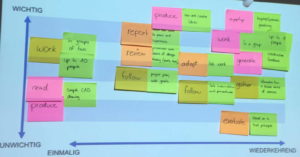It’s been almost two years since I introduced you to our Alumni Sounding Board, who have been helping us to keep in mind the industry perspective since the very beginning of our curriculum revision. Now that we are deep in the trenches developing the detailed project-based learning activities, we decided it was time to once again call on their expertise, in particular regarding how to prioritize the engineering competencies that will be taught via the projects.
Our choice of the start of both the ‘flu season and the end-of-year rush was perhaps not the best timing to call a meeting, but we managed to assemble a hardy and enthusiastic sub-set for a productive evening at Hönggerberg. We began with a quick presentation from Sara of the completed curriculum outline and clarified a few questions: Programming will be taught in both Matlab and Python; Statistical data evaluation will be integrated into several courses; Materials databases will be used extensively; Communication and creativity as well as economic and ecological aspects, will be emphasised in the projects. We then had a “sticky-notes discussion” in which the participants were asked to prioritise the following set of transferable skills:
- Teamwork / idea generation / creativity
- Oral reporting
- Information searching in times of information overload
- Careful experimenting
- CAD design
- ICT Tools, programming
- Planning of projects
- Engineering design methodology
- Critical thinking
- Safety
- Ethics
- Frustration tolerance
- Each person had four green sticky notes to vote for the skills they found most important and four orange post-its for their least important choices.
There was general agreement about the most important skills:
- Teamwork / idea generation / creativity, with a focus on idea generation rather than evaluating the ideas,
- Engineering design methodology, including problem analysing, prototyping and testing,
- Critical thinking, and
- Information searching in times of information overload. Here the importance of being able to identify a suitable expert, and in turn the importance of alumni networks was emphasized; our plan of having more advanced students mentoring their junior cohorts in the projects will be ideal for fostering networking between class years.
Surprisingly to me, frustration tolerance and ethics — both of which are top of my list for incoming PhD students — were at the bottom of the list. Although on further discussion (and maybe a bit of grumbling from me) it was agreed that they are important, but should perhaps be acquired outside of the study programme. CAD was also not highly rated — making and interpreting simple designs is enough — on the grounds that if industry wants a design engineer it would not recruit a materials scientist.
There was some disagreement too: Oral reporting received both red and green sticky notes, with the red voters calling for emphasis on all types of communication, and the green favoring the agility that rapid oral reporting offers. And Safety received mixed votes, although after a short discussion the word “Safety” was replaced with “Risk awareness, including environmental risks” and universally supported.
Finally, we asked our participants to formulate learning objectives and rate them according to importance and the frequency with which they should be appear in the syllabus. Here, our Alumni totally outclassed myself and my colleagues, both with their use of active verbs (such as adapt, plan, evaluate, gather rather than the passive “learn” or “understand”) and in their ability to shuffle some things to the Master’s program. The following overview was created.
At the end, we retreated to quench our thirst and replenish some calories after an evening of hard work. Over a beer, one of the participants commented that the central skill that should be acquired is learning how to learn. I hope that our new curriculum will help students do exactly that, and that as educators we never lose sight of that goal.

